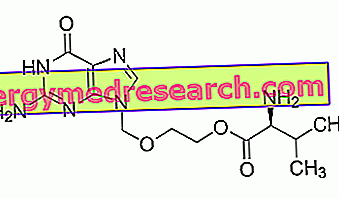Valaciclovir (or valaciclovir) is an antiviral drug.
More precisely, valaciclovir is a prodrug, which means that - before carrying out its antiviral action - valaciclovir must be converted through hepatic metabolism into its active metabolite: acyclovir.

Valaciclovir - Chemical Structure
Valaciclovir is more absorbed at the gastrointestinal level than its active metabolite acyclovir. Therefore, the oral administration of valaciclovir allows to reach higher plasma concentrations of acyclovir than those that could be obtained by administering acyclovir as such.
Indications
For what it uses
The use of valaciclovir is indicated for:
- Treatment of Herpes zoster virus (HSV) infections in adults;
- Prevention and treatment of recurrent HSV eye infections in adults and adolescents over 12 years of age;
- Prevention and treatment of skin infections due to Herpes simplex virus (HSV) and treatment of genital herpes in adults and adolescents over 12 years of age;
- Treatment of cold sores;
- Prevention of Cytomegalovirus (CMV) infections after organ transplants in adults and adolescents over 12 years of age.
Warnings
Before taking valaciclovir, you must inform your doctor if you are in one of the following conditions:
- If you suffer from kidney problems;
- If you suffer from liver problems;
- If you suffer from compromising your immune system;
- If you are over 65 years old.
Patients over 65 years of age and / or suffering from kidney problems should take large amounts of water during treatment with valaciclovir, in order to reduce the undesirable effects on the kidneys and the nervous system.
If you are taking valaciclovir to treat genital herpes, you should use barrier contraception methods to avoid transmission of the viral infection.
Valaciclovir can cause side effects that can affect the ability to drive and use machines, so caution should be used.
Interactions
Before starting therapy with valaciclovir it is necessary to inform your doctor if you are taking other medicines that can have negative effects on your kidneys. Among these drugs, we recall:
- Aminoglycosides (antibiotic drugs);
- Platinum- based compounds (they are anticancer drugs);
- Methotrexate, an anticancer;
- Contrast media containing iodine;
- Pentamidine, an antiprotozoal drug;
- Foscarnet, another antiviral;
- Ciclosporin or tacrolimus, immunosuppressive drugs;
- Cimetidine, a drug used to reduce acid secretion of the stomach;
- Probenecid, a drug used in gout therapy.
In any case, it is still necessary to inform your doctor if you are taking - or if you have recently been - drugs of any kind, including non-prescription medicines and herbal and / or homeopathic products.
Side effects
Valaciclovir can cause various types of side effects, although not all patients experience them. This depends on the sensitivity that each individual has towards the drug, therefore, it is not said that the adverse effects occur all with the same intensity in each person.
Below are the main side effects that may occur during treatment with valaciclovir.
Nervous system disorders
Valaciclovir therapy may cause:
- Headache;
- dizziness;
- Tremors;
- State of strong numbness;
- Ataxia;
- Dysarthria;
- Encephalopathy;
- Convulsions.
Psychiatric disorders
Treatment with valaciclovir can cause confusion, hallucinations, agitation and delirium.
Kidney and urinary tract disorders
Therapy with valaciclovir can cause kidney pain, haematuria (presence of blood - visible or not - in the urine), kidney problems with reduced passage or absence of urine.
Gastrointestinal disorders
During treatment with valaciclovir may occur:
- Nausea;
- He retched;
- Diarrhea;
- Stomach disorders.
Skin and subcutaneous tissue disorders
Valaciclovir therapy may cause:
- Itch;
- Skin eruptions;
- Light sensitivity;
- Urticaria.
Blood and lymphatic system disorders
Treatment with valaciclovir can lead to leukopenia and thrombocytopenia (decrease in the number of leukocytes and platelets in the bloodstream, respectively).
Other side effects
Other side effects that could occur during valaciclovir therapy are dyspnoea, increased liver substances and coma.
Overdose
If excessive doses of valaciclovir are taken, symptoms such as:
- Nausea and vomit;
- Kidney problems;
- Confusion;
- agitation;
- Hallucinations;
- Loss of consciousness.
In case of suspected overdose, contact your doctor immediately and contact your nearest hospital.
Action mechanism
As mentioned above, valaciclovir - to exert its action - must first be converted to acyclovir which, therefore, is the molecule with the antiviral activity proper.
Aciclovir interferes with viral DNA replication.
More in detail, acyclovir enters the cells infected by the virus and here it undergoes phosphorylations (ie phosphate groups are added) to become acyclovir triphosphate.
Aciclovir triphosphate has a structure very similar to that of guanosine triphosphate, one of the nucleosides that will constitute the new viral DNA.
Thanks to this resemblance to guanosine, acyclovir is incorporated into the new viral DNA strand that is forming and, in this way, manages to prevent further stretching of the same.
Mode of Use - Posology
Valaciclovir is available for oral administration as tablets.
The amount of drug to be taken varies according to the type of infection to be treated.
Patients over 65 years of age, suffering from kidney problems and / or with a weak immune system may need a dose adjustment of valaciclovir usually administered.
Below are some indications on the doses of antiviral usually used in therapy.
Treatment of Herpes zoster virus (HSV) infections
The dose of valaciclovir usually given for the treatment of Herpes zoster infections is 1000 mg, to be taken three times a day. Usually, the duration of the treatment is seven days.
Prevention of HSV infections
The dose of valaciclovir usually used for the prevention of HSV infections is 500 mg, to be taken in a single dose or in two divided doses.
The duration of treatment must be established by the doctor.
Treatment of cold sores
The dose of valaciclovir recommended for the treatment of cold sores is 2000 mg, to be taken in two divided doses at a distance of twelve hours from each other.
Prevention of Cytomegalovirus (CMV) infections after organ transplants
To prevent CMV infections, the usual amount of valaciclovir used is 2000 mg four times a day. Drug doses should be taken every six hours.
Generally, therapy should start as soon as possible after the transplant and continue for about 90 days. In any case, it is the doctor who decides when the treatment can be stopped.
Pregnancy and breastfeeding
Generally, the use of valaciclovir by pregnant women and by women who are breast-feeding is not recommended.
In any case, pregnant women and breastfeeding mothers should always seek medical advice before taking any type of medication.
Contraindications
The use of valaciclovir is contraindicated in patients with known hypersensitivity to valaciclovir or aciclovir.
Furthermore, valaciclovir is not recommended during pregnancy and lactation.



